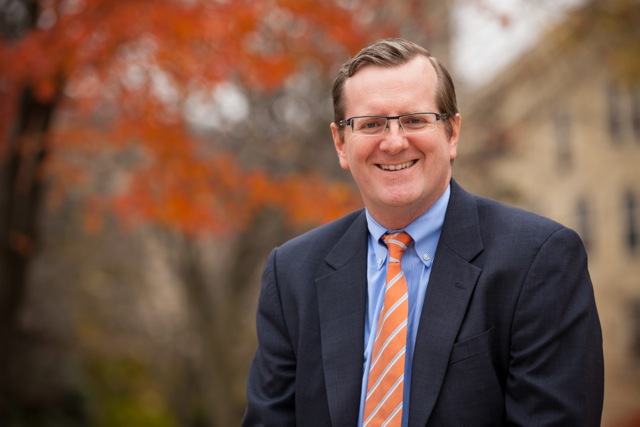The weekly TGCvocations column asks practitioners about their jobs and how they integrate their faith and work. Interviews are condensed.
 Philip Graham Ryken is a TGC Council Member and the eighth president of Wheaton College, where he studied philosophy and English literature and met his wife, Lisa. He earned a master of divinity degree from Westminster Theological Seminary in Philadelphia and a doctorate in historical theology from the University of Oxford. Ryken returned from England to join the pastoral staff at Philadelphia’s Tenth Presbyterian Church, where he preached for 15 years before becoming Wheaton’s president in 2010. He has published more than 40 books, including The Message of Salvation, Loving the Way Jesus Loves, and expository commentaries on Exodus, Jeremiah, Luke, Galatians, and other books of the Bible. He will preach on “A New Heaven and a New Earth” from Revelation 21:1–22:5 at The Gospel Coalition 2015 National Conference, April 13 to 15 in Orlando.
Philip Graham Ryken is a TGC Council Member and the eighth president of Wheaton College, where he studied philosophy and English literature and met his wife, Lisa. He earned a master of divinity degree from Westminster Theological Seminary in Philadelphia and a doctorate in historical theology from the University of Oxford. Ryken returned from England to join the pastoral staff at Philadelphia’s Tenth Presbyterian Church, where he preached for 15 years before becoming Wheaton’s president in 2010. He has published more than 40 books, including The Message of Salvation, Loving the Way Jesus Loves, and expository commentaries on Exodus, Jeremiah, Luke, Galatians, and other books of the Bible. He will preach on “A New Heaven and a New Earth” from Revelation 21:1–22:5 at The Gospel Coalition 2015 National Conference, April 13 to 15 in Orlando.
Your work as a college president involves many different roles and responsibilities. Is there any kind of typical day for you?
Not really. I try to save time as much time as I can in the morning for study, prayer, writing, and preparing to preach and speak. I take appointments the rest of the day. The only commonality [between the days] is that there always seems to be too much to do. (I’m a big advocate of Grundsday, though, which is the extra day between Wednesday and Thursday for getting everything done.) I also try and protect a whole day in the middle of the week to get longer projects finished. That doesn’t always work out.
In Numbers 18, God characterizes the priestly calling as both burden and blessing. What aspects of your role are burdensome? Which are most joyful?
As is true with other ministry work, the most burdensome things about my role are broken relationships and dealing with harsh criticism. The most joyful things involve students. When students are using their gifts and growing spiritually, when I have opportunities to connect with them relationally, that tends to be most joyful for me.
“Priestly” is definitely a category for my work, particularly as I think about the priesthood of Jesus. A priestly ministry involves both prayer and presence. I suppose prayer can be both a burden and a blessing, and being with people can be a burden and a blessing.
What are the most important lessons of leadership you’ve learned in this role that may be new from the lessons you learned in the pastorate?
On campus and in the church, the biggest problems are the people problems. One thing that seems different to me is that the leadership of a president is more mediated than the ministry of a pastor in a local church, which is more immediate.
There’s a sense in which I am everybody’s president, but a college campus is fairly hierarchical. A fair amount of the work on campus is more than one person removed from a direct relationship with me. In a church, everyone wants a direct relationship with pastor, and the pastor can cast a vision for the community every week. As a college president, I get fewer opportunities [with that kind of direct access] and have to make the most of them. My leadership is more mediated through the leadership of others I am growing and developing.
Some would idealize working with on a Christian campus like Wheaton College. How would you describe the brokenness you see from your particular vantage point?
I grew up on this campus. Though I love it, it’s never tempting to idealize it. I often remind people there’s not a college campus in the world that’s in greater need of the gospel than our campus.
One aspect of brokenness we see is the brokenness of the family: college students are processing their own identity and often coming to grips with things that are broken in their family relationships. In addition, some of the biggest hurts college students experience are from their peers. That’s not something that anyone in leadership can control, but it is something wise leaders and mentors can help students process, heal from, and grow through.
Is there enough evidence for us to believe the Gospels?
 In an age of faith deconstruction and skepticism about the Bible’s authority, it’s common to hear claims that the Gospels are unreliable propaganda. And if the Gospels are shown to be historically unreliable, the whole foundation of Christianity begins to crumble.
In an age of faith deconstruction and skepticism about the Bible’s authority, it’s common to hear claims that the Gospels are unreliable propaganda. And if the Gospels are shown to be historically unreliable, the whole foundation of Christianity begins to crumble.



































